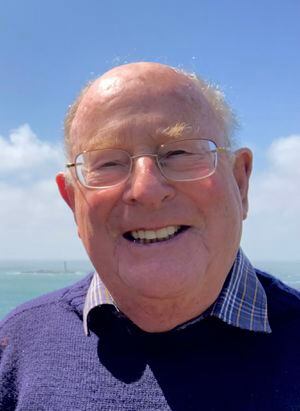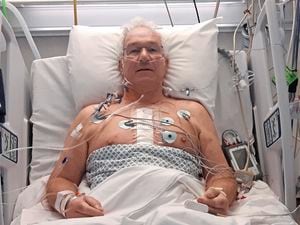Obituary: Dr John Toynton
IT IS IMPOSSIBLE in a few columns to do justice to the life story of someone who had so many interests and stories.

Dr John Toynton, who died aged 84, local general practitioner and ear, nose and throat surgeon, will be remembered for his clinical care, the part he played in developing medical services in Guernsey, and for the boundless enthusiasm, good nature, and friendly disposition that touched many lives.
A bon viveur, he excelled in the positive atmosphere that both Dulwich College and St Thomas’s Hospital Medical School provided. He qualified as a doctor in 1962 and, after a period in West Africa between 1965 and 1967, settled in Guernsey, joined the St Sampson’s Practice, and assisted with their expansion. He was later one of the founding members of the Medical Specialist Group, was the divisional surgeon of St John Ambulance, and one of the lifeboat doctors.
Christopher John Toynton, known always as John, was born in Croydon, South London on 24 August 1938, the son of two schoolteachers, Clement and Frances. His first memories were from the late and immediate post-war years. He recalled hearing the engines of V2 rockets, running into the Anderson shelter during air raids, and clambering over bomb sites looking for pieces of shrapnel that he could swap with school friends.
John was one of the first children in England to win an assisted place from his local council to a private school. He did well at Dulwich College both academically and in sport, representing the school at swimming, rugby, and boxing. He was rewarded with a place at St Thomas’s Hospital Medical School in London, qualifying in 1962.
When at medical school, John was often an observer in the operating theatre. One day some forceps were dropped on the floor and both he and a pretty young Nightingale nurse scrambled to pick them up. Their eyes met, and for him it was love at first sight. They were married in Cobham, Surrey by the St Thomas’s Hospital chaplain on 14 July 1962. He referred to her as his ‘darling Nightingale’. She was his great love and was by his side supporting everything he did until she unfortunately passed away at the start of the Covid pandemic.
After working in the Emergency Department in Jersey, and as a GP locum in Guernsey, he set off to West Africa in 1965 with his wife Anthea and two small sons, Stephen aged two, and James only a few months old.
John loved the whole adventure.
He worked as a plantation doctor for Unilever, mainly in Sapele, Nigeria. Each week he would paddle across the Niger in a dugout canoe to do an operation list at the local hospital and drive or fly into the bush to do clinics. On one occasion his then meagre surgical experience was tested when, by candlelight, he had to perform an amputation for severe gangrene, with a nurse holding open the appropriate page of the Manual of Surgery. The patient’s life was saved and many years later his brother visited John in Guernsey to express his gratitude.
The plantation doctor was the only one for the whole rural population covering about 10,000 square miles. John often went with his driver in a VW ambulance deep into the bush to small communities. On one occasion, his young son with them, John decided that they should take a swim in a nearby small lake to cool off. When afterwards he asked why so many of the villagers had come out to watch, his driver informed him that ‘no one ever swims there, they just wanted to see whether or not you would both be eaten by the crocodile’.
John’s tendency to ignore curfews, the isolation, and the news of spreading violence, made Anthea, who was looking after the two young sons, understandably apprehensive. When the Biafran war broke out, a transfer to neighbouring Cameroon was very welcome.
The family moved to Guernsey in 1967 and two daughters, Clare and Helena, were subsequently born.
John was a much-loved GP, GP obstetrician and ENT surgeon. In the course of his working life, he delivered many babies, often two generations. In those days any babies suffering from Rhesus incompatibility would have to be flown urgently to England for treatment, but he arranged training for himself and others, so that the necessary exchange transfusions could be performed locally.
Many more will remember him for removing their tonsils. John was blessed with wonderful colleagues at St Sampson’s, L’Aumone, and Bosq Lane surgeries, all of whom became firm family friends. Dr Bill Fox had previously performed the ENT work for their practice and John had continued this on the basis of experience but without any formal post-graduate qualification. The health service in Guernsey was being modernised, and so he acquired a further post-graduate examination, the Diploma of Otolaryngology, which was no mean achievement for someone nearing 50.
He was a founding member of the Medical Specialist Group, which meant leaving the St Sampson’s Practice, and while he very much worried that he had let down his friends, he was sure that the new arrangement was in the best interests of the Guernsey people and their quality of care.
John nurtured medical relationships with the ENT Department in Portsmouth, and their surgeons visited Guernsey regularly. He was delighted that, on his retirement, a successful case was made for Guernsey to employ its own two ENT specialists.
John particularly enjoyed the collaborative atmosphere of the operating theatre and appreciated the expertise and friendship of all the anaesthetists with whom he worked, particularly the late Dr Stephen Rebstein, and Drs David Swainston and Alan Boyle. A jovial inclusive nature made John a popular chairman and committee member. He was on the Board of Health for some years, was the chair of the regional British Medical Association, and helped establish, and was chair of, the Guernsey Hard of Hearing Association.
John’s enthusiasm for medicine and science was infectious, encouraging many in his extended family to study medicine or its allied professions. His involvement with St John Ambulance was as the Bailiwick Surgeon (predominantly an advisory and training role), and also with the Hyperbaric Medical Project led by the late Dr Johnny Bolt and Micky Peters. They established the first civilian hyperbaric facility in Great Britain to treat divers with the bends.
Both John and Anthea (who was the Bailiwick Superintendent of St John in 1975) would have been honoured and delighted that St John Ambulance were formally represented at his funeral by their colour party. John was also one of the lifeboat doctors and attended a number of launches over the years. He had huge admiration and respect for the crew and the organisation. Their courage, skill, comradery, and dedication were the qualities he most admired.
John’s love for boating was well known and emanated from walking past Ernest Shackleton’s boat, the James Caird, every morning when at Dulwich College. With a good friend, John Boynton, the plantation manager and master carpenter at Sapele, he built a Mystic class 21’ boat from plans published in the Yachting monthly magazine. She was named Sapoba after the village where she was built and was usually the smallest boat on the Guernsey to Jersey yacht race (then the Piccadilly trophy).
He subsequently changed his craft regularly, usually in an attempt to find one that suited his diminishing mobility and his wife’s dislike of water. Jumelle, a Heavenly Twins catamaran that he fitted out with help of a few friends, was his favourite. Many will remember, with great affection, numerous trips, picnics and holidays throughout the islands and along the Brittany coast.
In later years John and Anthea turned their attention from the sea to old cars and were often to be seen in their Austin 7, Primrose, driving around the island and abroad. They were enthusiastic members of the Guernsey Old Car Club, of which he was a past vice-president, and three-time winner, and (perhaps ironically) current holder of the ‘Hard Cheese’ award (given for breakdowns). They made many friends from among its members.
A few days before he died John recollected how much he had loved sport, particularly the exhilaration and camaraderie that rugby had offered. He had played for Dulwich College, for St Thomas’s Hospital, in a Siam cup-winning Jersey team, and for Guernsey. His favourite sports, however, were swimming and water-polo. He would be forever encouraging his family to swim around his boat or when ‘the water comes in over the hot sand’, always declaring the water to be ‘lovely’, whatever the temperature!
Particularly after retirement, John and Anthea spent a lot of time with their grandchildren and often took them for picnics, boating, and to the beach. They would often join Grandad in his workshop to help with the making and mending of numerous items.
Frances, his mother, had been a very keen botanist, and influenced all of her children. John’s general knowledge was unusually broad, helped by always having been an avid reader. He delighted in teaching family, and anyone interested, to learn to identify trees, flowers, birds, and fungi. He particularly enjoyed trips to Herm and Sark to see the puffins and Guillemots. John created a wildflower and orchid meadow at his home at La Rocque Balan for which he won an island ecology award, of which he was very proud.
Until recently he was chairman of the Friends of the Common committee. In his last weeks he was to be seen in his buggy driving around the common and in his field advising where to mow and where not to, helped by his family, friends, and lovely patient neighbours. Those were times to cherish and remember.
Of all his qualities John’s greatest was his ability to make friends. The numbers at his funeral paid testimony to that. Adjacent to St Thomas’s Hospital in London was a pub named the Two Sawyers, where his classmates would drink in the evenings and at weekends. In their final year their beloved pub was demolished and so they formed a dining club, naming it in its honour. They have met twice a year since 1963. The Sawyer’s Club have been remarkable in their collective friendship over many years. John and Anthea attended almost all of the meetings. They loved giving parties and for many years put on an annual bonfire celebration, barbecues for the Hard of Hearing Association, as well as numerous other wonderful gatherings.
In the few years since his wife died, John hugely appreciated the care and help that he was given by his family, friends, and neighbours. Recurrent cancer led to his deterioration and ultimate end, but despite the unpleasantness and discomfort of
his condition he bore it uncomplainingly with his typical bravery and stoicism.
John will be remembered not only for the boundless enthusiasm and good humour that made him a
great team-mate, colleague, brother, father, grandfather, and great-grandfather, but for his friendship to so many.
He is greatly missed.





